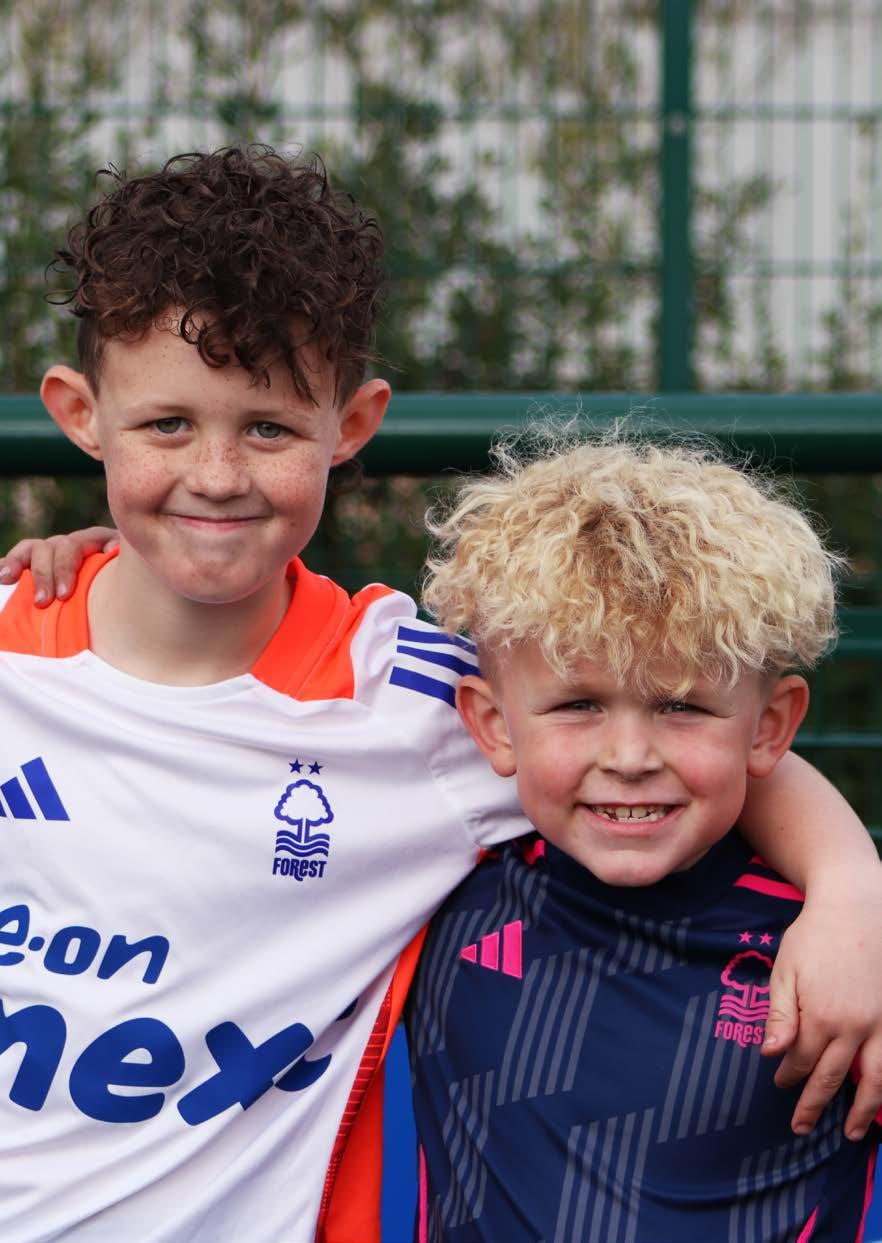

2024/25 IMPACT REPORT
EXECUTIVE SUMMARY
The 2024/25 season reinforced Nottingham Forest Community Trust’s role as a catalyst for positive change across Nottingham and Nottinghamshire. Building on its strategic priorities of health & wellbeing, education & employment, and community engagement, the Trust delivered wide-reaching programmes that engaged thousands of people of all ages, with 2,392 survey responses (1,216 participants and 1,176 parents) providing a robust evidence base.
Health & Wellbeing outcomes were particularly strong. 86% of participants reported that NFCT activity had a positive impact on their physical wellbeing, while 85% reported improved mental wellbeing, a 5% increase compared to the previous season. Junior physical activity levels were a standout success, with 81% classed as active – 9.2% higher than in 2023/24 and 38% above the national average. Adults also performed well, with 73% active, 9.1% above the national average.
Personal wellbeing measures showed consistent improvements: junior scores rose across happiness (7.64), life satisfaction (8.09), and sense of worthwhile life (7.74), while average anxiety fell to 2.45. Adult scores also improved modestly (happiness 7.31, life satisfaction 7.27, worthwhile life 7.60), with anxiety stable at 3.41. General health among adults held steady, with 70% reporting good or very good health, outperforming national benchmarks by nearly 4%.

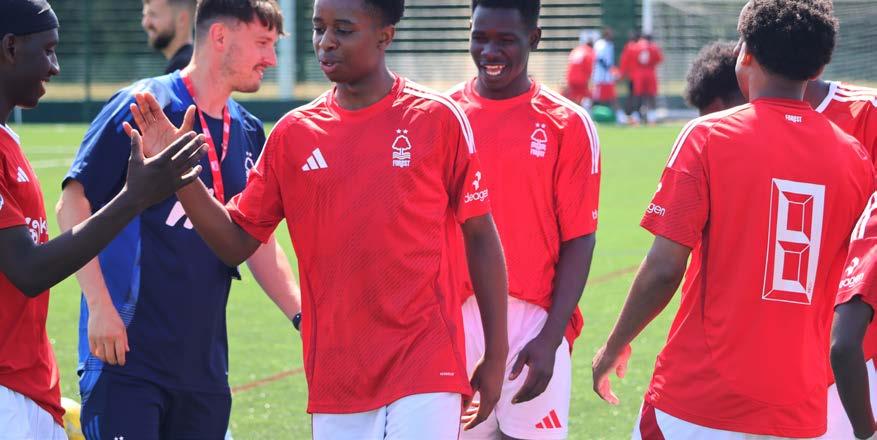

In Education, Training & Employment, 78% of participants felt NFCT positively supported their personal development, although this was 3.8% down on last season. Juniors maintained strong results (82%), while adults dropped to 76%.
Access to opportunities declined most sharply, with just 53% agreeing NFCT opened more pathways (down 6%), highlighting a key challenge. Resilience, however, remained a strong point: 83% of juniors and 78% of adults reported confidence in their ability to achieve goals, both above national averages.
Community Engagement continued to show positive results. 83% of participants felt their sense of community improved through NFCT, and 75% of adults reported a strong sense of belonging to their neighbourhood, 21% above the national average. Trust indicators were more mixed: 30% of juniors said they could trust others ‘a lot’ (10% above national averages), while adults averaged 5.89 out of 10 (slightly up from last year but still below the
national benchmark). A new “community integration” measure showed encouraging results, with 78% of participants believing people from different backgrounds get on well in their area (73% juniors, 81% adults –the latter 27% above the national average).
Feedback from parents, captured systematically for the first time, was overwhelmingly positive: 98% reported NFCT improved their child’s physical wellbeing, 96% their mental wellbeing, 97% their personal development, and 91% their sense of community.
Overall, the report demonstrates a picture of sustained and growing impact, particularly in mental wellbeing, youth engagement, and resilience. At the same time, it identifies clear areas for improvement, especially around access to opportunities and long-term personal development. As NFCT moves into the 2025/26 season, the Trust will build on its strengths while responding to these insights with renewed focus.
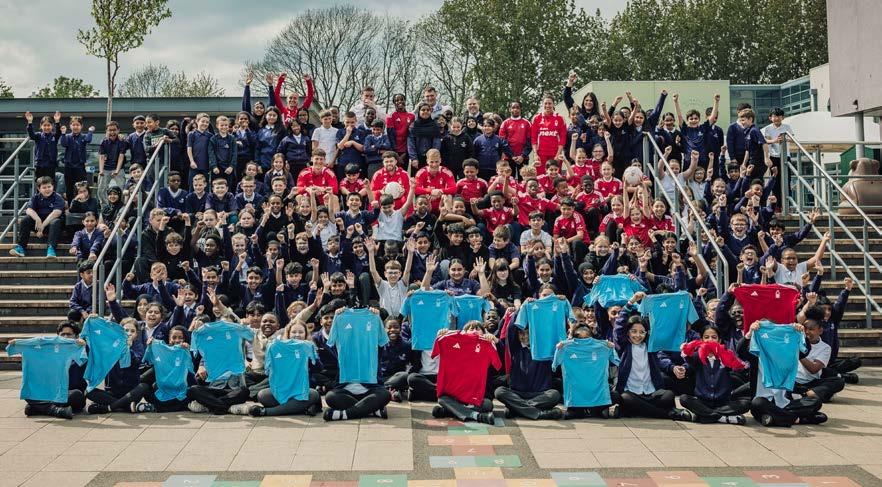


THRIVING THROUGH PURPOSE
At Nottingham Forest Community Trust, we are a catalyst for change across Nottingham and Nottinghamshire. We believe in making our work accessible to everyone, staying committed to the people and places we serve, and always taking a progressive approach to how we deliver impact.
These values shape everything we do. From building stronger communities to creating new opportunities and supporting long-term change, we are rooted in the heart of our community and inspired by its potential. We work side by side with people of all ages and backgrounds to make a lasting difference.
MEASURING IMPACT
Throughout the 2024/25 season, Nottingham Forest Community Trust has remained committed to capturing, analysing, and understanding the difference our work makes.
In partnership with Evid Impact, we have continued to embed robust monitoring and evaluation practices across our programmes. This ensures we remain accountable to our 2023 to 2026 strategic plan. These tools help us assess how effectively we are delivering against our three strategic priorities: Health and Wellbeing, Education, Training and Employment, and Community Engagement.
This year’s results show encouraging signs of progress. Several key impact measures have increased, while many have remained steady year on year, suggesting our impact is not only meaningful but also sustainable.
However, the evaluation has also highlighted a number of areas where performance has declined. These insights will inform our focus as we move into the 2025/26 season, allowing us to respond with renewed effort and targeted support.
As ever, the data has been analysed in context, drawing comparisons across local, regional, and national benchmarks where possible, and identifying trends based on participant feedback and engagement over time.


THE FINAL SCORE: ANOTHER SEASON OF IMPACT
The 2024/25 season has seen the Trust continue to make a tangible difference across Nottingham and Nottinghamshire. Thousands of participants, partners, and community members have contributed to a collective effort that continues to drive meaningful, lasting change.
Together, we remain committed to building a healthier, more inclusive, and more resilient future.
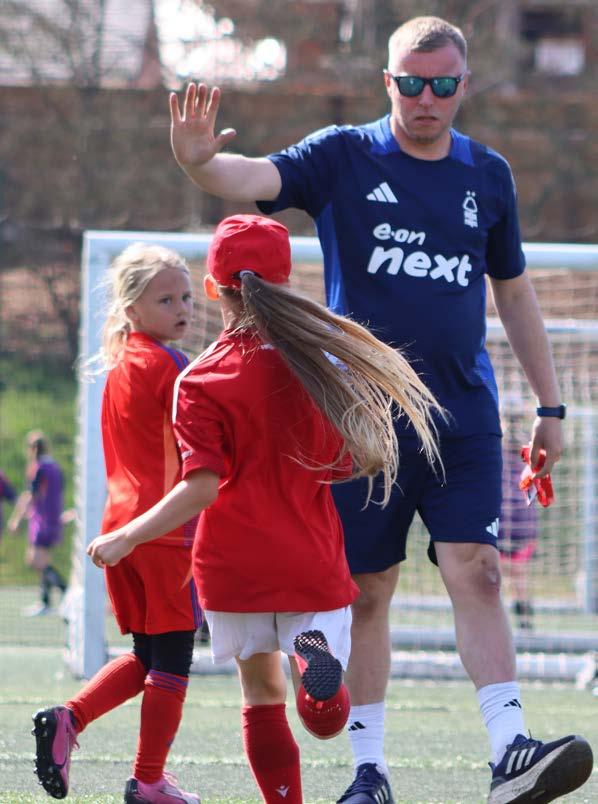

MEASURING WHAT MATTERS
The latest impact report details the social and community impact of Nottingham Forest Community Trust (NFCT) for the 2024-25 season. It represents the second season of comparable research, which aims to provide us with a greater understanding of the difference that its activities have on its participants and the community.
The evaluation incorporates measures related to:
■ Physical wellbeing.
■ Mental wellbeing.
■ Personal (individual) development.
■ Community development.
■ Wider participant (and parent) feedback.

The results of the evaluation have been analysed to understand:
1. The headline impact of Nottingham Forest Community Trust activities.
2. Comparison against national, regional and local benchmarks where available.
3. Trends by participants’ duration of engagement with NFCT (where data allowed).
4. Comparison between season 2024-25 and 2023-24.

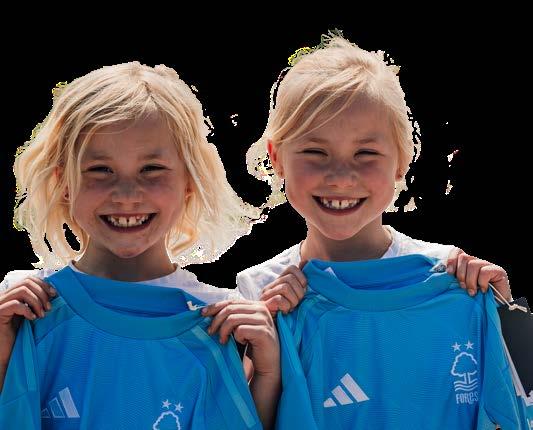
METHODOLOGY & APPROACH
Data was collected across two survey periods in autumn 2024 and spring 2025, gathering 2,392 valid responses in total. This comprised 1,216 responses from participants and 1,176 responses from parents of participants. Further responses from NFCT staff, volunteers and wider stakeholders provided additional qualitative insight. The methodology used has remained consistent from the 2023-24 season to ensure consistency and comparability.
Several additions were incorporated into this season’s report:
■ Parent perceptions: Significant parent response levels enabled reporting of how parents perceived NFCT activity to impact their children, and benefits parent’s own lives.
■ Community integration measure: Added to better understand community cohesion via whether a person feels that people from different backgrounds get on well together in their local area.


■ Additional insights into access to opportunities: Further qualitative detail was gathered on participants’ access to opportunities gained owing to activity at NFCT.


OUTCOMES FRAMEWORK 2024-25
TRUST-WIDE, AGES 11+
NFCT STRATEGIC PRIORITY
HEALTH & WELLBEING
Significantly increase improvements in local people’s Health and Wellbeing.

c.
EDUCATION, TRAINING & EMPLOYMENT
Significantly increase opportunities for local people to access high quality education and training, leading to meaningful sustainable employment.
COMMUNITY ENGAGEMENT
Significantly increase reach into our local communities through our delivery of Community Engagement programmes.
IMPACT MEASURES
13. First-person experiences of how NFCT helps participant in their life or at school
14. First-person experiences regarding followon attainment (e.g. education or employment)
15. Further detail on access to opportunities gained owing to activity at NFCT*
measure for 2024-25.
CONSISTENT SCORES, CONTINUED IMPACT
Sustained impact across majority of measures
■ High wellbeing and community measures: Impact of NFCT on physical wellbeing (86%), mental wellbeing (85%) and sense of community (83%) remain high, showing consistent impact since 2023-24.
■ High physical activity levels: Participants’ levels of physical activity remain substantially higher than national averages.
Increased impact on mental wellbeing
■ During 2024-25, participants reported increased positive impact on mental wellbeing as a result of activity with NFCT; +5.3% for juniors and +4.8% for adult participants compared to 2023-24.
■ Higher personal wellbeing scores were reported in 2024-25 compared to the season prior across both juniors and adults.
■ Juniors derive greater impact than adults and this trend is more pronounced in 2024-25 compared to 2023-24.
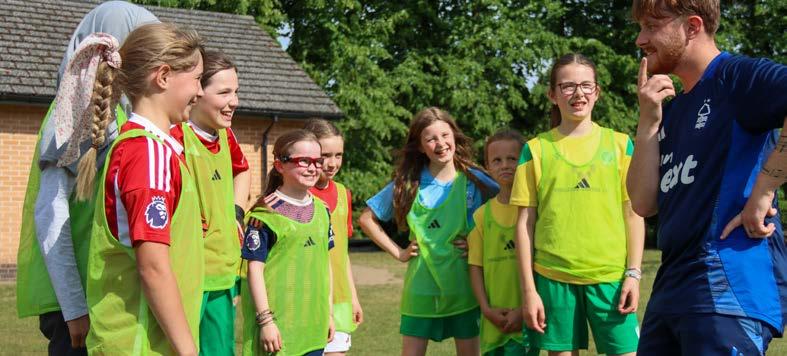



Evidence of resilience was seen across all age groups
■ Adults: Both 2023-24 and 2024-25 seasons saw over 3 in 4 respondents report high levels of resilience.
■ Juniors (aged 11-16): Levels remained high for junior participants in 2024-25, with scores 14% above the national average.
■ Primary-aged children (5-11): Resilience showed 3.7% increase for year 5-6 participants across one year engaging with programme.
High scores across community impact measures
■ Strong sense of community: Sense of community scores remain high (83%) despite slight year-on-year decrease.
■ Sense of belonging and trust in others: Both measures are consistent with 2023-24, with adult scores 21% above the national average, and junior levels of trust 10% above average.
■ Community integration: New measure for 2024-25 showed high levels of community cohesion across both adults and juniors.
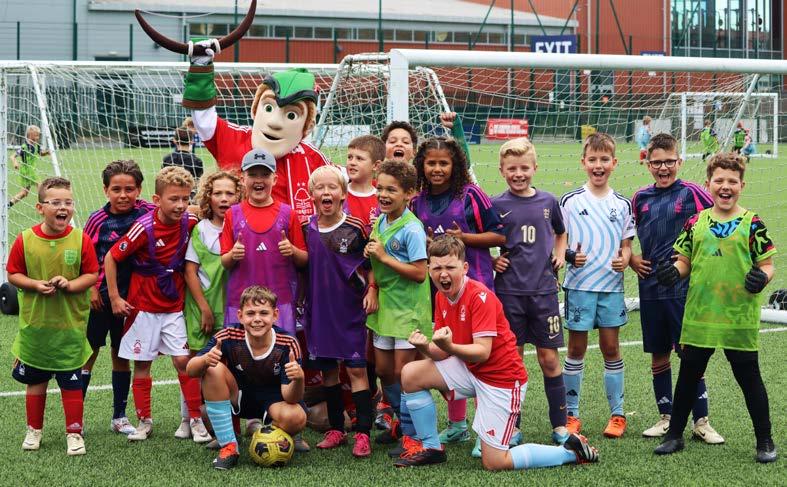
Further focus needed
■ Education, training & development: Measures of personal development impact and access to opportunities were not as strong as 2023-24.
24-25 VS. 23-24
With two seasons of data now available, we are able to compare results year on year. This allows us to highlight areas where impact has been sustained or improved, as well as identify where outcomes have fallen short. These insights are key to understanding our progress and shaping our focus for the seasons ahead.
LEVELS OF PHYSICAL ACTIVITY
Juniors: 81% active (+9.2%)
Adults: 73% active (-2.2%)
IMPACT ON PHYSICAL WELLBEING
All: 86% positive or very positive (-1.4%)
IMPACT ON MENTAL WELLBEING
All: 85% positive or very positive (+5.1%)

IMPACT ON PERSONAL WELLBEING, INCLUDING HAPPINESS, LIFE SATISFACTION, SENSE OF WORTHWHILE LIFE
Juniors: 7.82 out of 10 (+0.20)
Adults: 7.39 out of 10 (+0.16)
LEVELS OF ANXIETY
Juniors 2.45 out of 10 (-0.41) Adults 3.41 out of 10 (-0.01)
GENERAL HEALTH
Adults: 70% good or very good (+0.4%)
IMPACT ON PERSONAL DEVELOPMENT
All: 78% positive or very positive (-3.8%)
IMPACT ON ACCESS TO OPPORTUNITIES
All: 53% agreed or strongly agreed (-6.0%)
RESILIENCE (ABILITY TO ACHIEVE GOALS)
Juniors: 83% agreed or strongly agreed (-3.0%)
Adults: 78% agreed or strongly agreed (+2.9%)
IMPACT ON SENSE OF COMMUNITY
All: 83% agreed or strongly agreed (-3.0%)
SENSE OF BELONGING
Adults: 75% strong or very strong (+1.1%)
TRUST IN OTHERS
Juniors: 30% ‘a lot’ (+0.6%)
Adults: 5.89 out of 10 (+0.16)
LOCAL COMMUNITY INTEGRATION
All: 78% agreed or strongly agreed (new measure for 24-25)
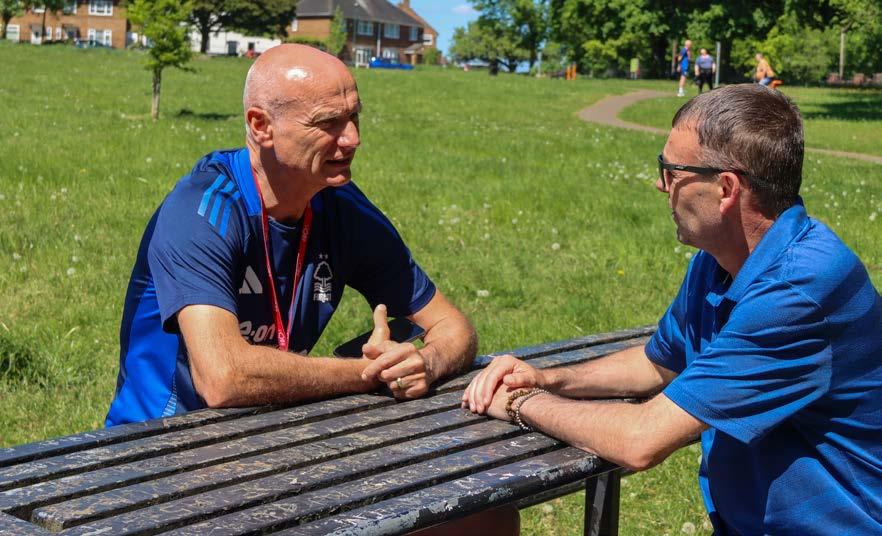

STRATEGIC PRIORITIES AND ACHIEVEMENTS




CHAMPIONING BETTER HEALTH & WELLBEING
We are dedicated to making a lasting difference in people’s lives by supporting healthier lifestyles and improving wellbeing across our communities.
Our approach is rooted in collaboration, working alongside health professionals, local partners and residents to co-design initiatives that respond to real needs.
By using proven methods and actively listening to those who take part, we adapt and strengthen our delivery to stay relevant and impactful.
Participants tell us that our programmes don’t just offer short-term benefits; they help build confidence, habits, and support networks that lead to long-term physical and mental health improvements.

LOCAL CHALLENGES
PHYSICAL HEALTH AND WELLBEING
■ Inactivity - In Nottinghamshire, 29% of children and 26% of adults are classed as inactive.
■ Obesity - 38% of children and 66% of adults in Nottinghamshire are overweight or obese.
■ Healthy Life Expectancy - At birth is 60 for females and 62.4 for males in Nottinghamshire, below the national average.

MENTAL HEALTH AND WELLBEING
■ Personal wellbeing - Residents report lower levels of happiness, life satisfaction and sense of worthwhile life than the national average.
■ Anxiety - 24% of adults in Nottingham report high levels of anxiety.
OUR ACTIONS
NFCT SUPPORTS COMMUNITY HUBS THAT INCORPORATE HEALTH AND WELLBEING SERVICES, NFCT PROGRAMMES AND SPORT.
NFCT SUPPORTS LOCAL PEOPLE’S MENTAL HEALTH BY BUILDING PROGRAMMES THAT HELP SPECIFIC ISSUES.
NFCT SUPPORTS INCREASED ACCESS TO FOOTBALL AND MULTI-SPORT FOR LOCAL PEOPLE WITH DISABILITIES AND SPECIAL EDUCATION NEEDS.
EXPECTED OUTCOMES
SHORT-TERM (WEEKS)
■ Increased opportunities to be physically active.
■ Higher engagement in mental health and wellbeing programmes.
■ Increased access to sport and activity for people with disabilities and special educational needs.
MEDIUM-TERM (MONTHS)
■ Improved, more physically active lifestyles.
■ Improved measures of personal wellbeing.
■ Reduced pressure on primary healthcare services.
LONG-TERM (YEARS)
■ Sustained increase to levels of physical activity.
■ Improvement in physical health, mental health and quality of life.
■ Reduced levels of inactivity and obesity.
HEADLINE RESULTS

of participants felt their activity at NFCT was positive or very positive for their physical wellbeing.
3 IN 4 PRIMARY-AGED PARTICIPANTS (75%) FELT THAT THEIR ACTIVITY HAS A POSITIVE OR VERY POSITIVE IMPACT ON THEM MAKING FRIENDS.
86% 91% 81% 38%
of primary-aged participants felt that their activity has a positive or very positive impact on them being active.
85% OF PARTICIPANTS FELT THEIR ACTIVITY AT NFCT WAS POSITIVE OR VERY POSITIVE FOR THEIR MENTAL WELLBEING, 5% HIGHER THAN THE 2023-24 SEASON.
JUNIOR MEASURES OF PERSONAL WELLBEING WERE HIGHER THAN THE NATIONAL AVERAGE.
SUSTAINED ADULT ENGAGEMENT REPORTED 5.9% LOWER LEVELS OF ANXIETY.
JUNIOR PARTICIPANTS’ LEVELS OF ANXIETY WERE 17% LOWER THAN THE NATIONAL AVERAGE.
of junior participants were classed as active –above the national average.
Adult participants classed as active 73% 9.1% above the national average.
HEALTH & WELLBEING
IMPACT ON PHYSICAL WELLBEING
Self-disclosed measure of whether the participant believes their activity at NFCT has a positive or negative impact on their physical wellbeing.
HEADLINE RESULT
BY AGE
BY DURATION IN PROGRAMME
COMPARISON TO SEASON 2023-24

86% of participants felt their activity at NFCT was positive or very positive for their physical wellbeing.
■ 86% of juniors positive or very positive.
■ 86% of adults positive or very positive.
Participants who have been part of NFCT programmes for 1+ years reported:
■ 6.1% higher impact on physical wellbeing (junior)
The result for season 2024-25 was 1.4% lower than the 2023-24 season result (88%).
BREAKDOWN BY RESPONSE
Notes:
■ n = 532
■ Juniors aged 11-16, Adults aged 16+
HEALTH & WELLBEING
LEVELS OF PHYSICAL ACTIVITY (JUNIORS)
Junior physical activity measured in average number of minutes active per day. Benchmarks are for applicable age group (aged 11-16).
DISTRIBUTION OF PARTICIPANT SCORES

■ For junior participants, on average 29% of their physical activity took place during their activity with NFCT – 1.6% higher than during the 2023-24 season.
ANALYSIS AGAINST BENCHMARKS:
■ Proportion of junior participants classed as active is 38% above national average and 40% above local average.
■ Proportion of junior participants classed as less active is 21% below national average and 20% below local average.
Breakdown by classification:
Notes:
■ n = 177
■ Juniors aged 11-16
■ Benchmarks: Sport England Active Lives
HEALTH & WELLBEING
LEVELS OF PHYSICAL ACTIVITY (ADULTS)
Adult physical activity measured in average number of minutes active per week.
DISTRIBUTION OF PARTICIPANT SCORES

■ For adult participants, on average 23% of their physical activity took place during their activity with NFCT – down 6.2% from season 2023-24.
ANALYSIS AGAINST BENCHMARKS:
■ Proportion of adult participants classed as active is 9.1% above national average and 8.4% above local average.
■ Proportion of adult participants classed as inactive is 13% below national and local averages.
Breakdown by classification:
Notes:
■ n = 254
■ Adults aged 16+
■ Benchmarks: Sport England Active Lives
HEALTH & WELLBEING
IMPACT ON MENTAL WELLBEING
Self-disclosed measure of whether the participant believes their activity at NFCT has a positive or negative impact on their mental wellbeing.
HEADLINE RESULT
BY AGE
BY DURATION IN PROGRAMME
COMPARISON TO SEASON 2023-24

85% of participants felt their activity at NFCT was positive or very positive for their mental wellbeing.
■ 85% of juniors positive or very positive.
■ 85% of adults positive or very positive.
Participants who have been part of NFCT programmes for 1+ years reported:
■ 8% higher impact on mental wellbeing (junior)
The result for season 2024-25 was 5% higher than season 2023-24’s result (80%).
BREAKDOWN BY RESPONSE
Notes:
■ n = 532
■ Juniors aged 11-16, Adults aged 16+
HEALTH & WELLBEING
PERSONAL WELLBEING
Analysis of the ‘ONS Four’ – four standard measures of overall personal wellbeing.
PERSONAL WELLBEING SUB-MEASURES
The four measures of personal wellbeing are:
■ 4a. Happiness
■ 4b. Life satisfaction
SUMMARY OF RESULTS

■ 4c. Sense of worthwhile life
■ 4d. Levels of anxiety
Average results for all junior measures of personal wellbeing were higher than the national average (by between 13-19%).
Average results for all adult measures of personal wellbeing were lower/ worse than the national and regional averages (by between 1-6%).
RESULTS OVERVIEW BY MEASURE
Notes:
■ n = 316 (adults); n = 222 (juniors)
■ Juniors aged 11-16, Adults aged 16+
C. SENSE OF WORTHWHILE LIFE
All measures of personal wellbeing were higher than the previous 2023-24 season’s results, for both juniors and adults.
HEALTH & WELLBEING GENERAL
HEALTH
Self-disclosed measure of how person’s health is in general.
HEADLINE RESULT
ANALYSIS AGAINST BENCHMARKS
COMPARISON TO SEASON 2023-24

■ 71% of NFCT participants reported good or very good levels of general health.
■ 29% of NFCT participants reported fair, bad or very bad levels of general health.
Levels of good or very good general health amongst NFCT adult participants were 3.8% higher than national average (67%).
The results for season 2024-25 were in line with season 2023-24’s result (70% and 30% respectively).
BREAKDOWN BY RESPONSE:
Notes:
■ n = 315
■ Adults only aged 16+
■ Benchmarks: Office for National Statistics
CREATING OPPORTUNITIES THROUGH EDUCATION AND EMPLOYMENT
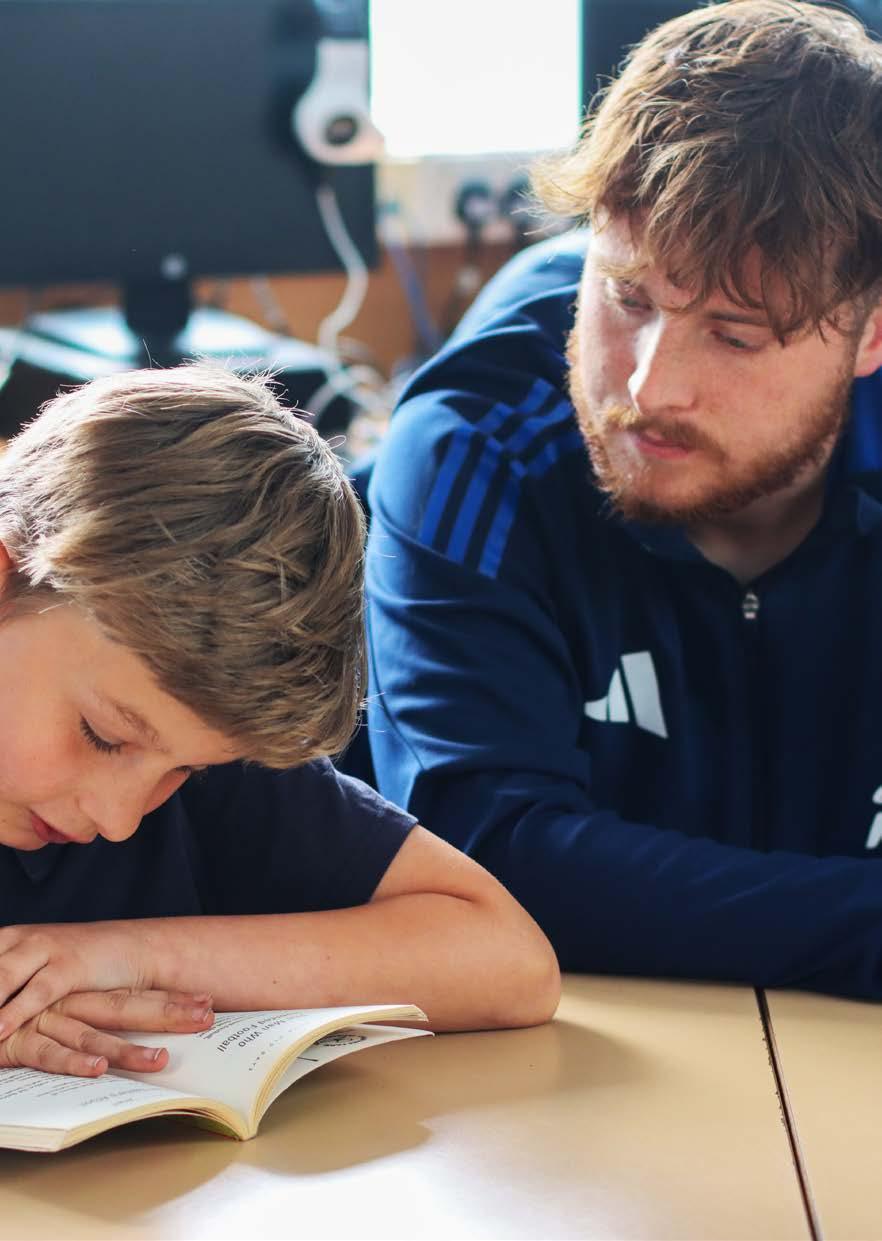
We believe that access to education, skills development and meaningful employment is essential to building stronger, more resilient communities.
Our programmes support local people to gain qualifications, grow in confidence, and take steps toward long-term personal and professional success.
By making our support inclusive and responsive to individual needs, we help participants overcome barriers and realise their potential.
Whether it’s preparing for the workplace, re-engaging with learning, or taking the next step in a career, we focus on creating clear, achievable pathways.
This work not only changes individual lives but also contributes to a more connected, confident and economically active community across Nottingham and beyond.
LOCAL CHALLENGES
EDUCATION
■ Educational standard - 42% of disadvantaged pupils in Nottinghamshire reach the expected standard by age 11 (66% for all other pupils).
■ SEND support - 21% of pupils in Nottinghamshire schools are receiving SEND support compared to 27% nationally.
■ Permanent exclusion - The level in Nottingham is 18 per 10,000 pupils, above the national average.

EMPLOYMENT
■ Unemployment - The rate in Nottingham is almost 5.9%, compared to 3.5% across the East Midlands.
■ NEET - 14% of 16-17-year-olds in Nottinghamshire are not in education, employment or training (NEET)
OUR ACTIONS
NFCT CREATES HIGH-QUALITY PRIMARY, SECONDARY POST-16 AND ADULT LEARNING PROGRAMMES.
NFCT CREATES PROGRAMMES THAT ENGAGE CHILDREN AND YOUNG PEOPLE AT RISK OF PERMANENT EXCLUSION.
NFCT CREATES OPPORTUNITIES AND PATHWAYS FOR LOCAL PEOPLE THAT WILL HELP THEM ACHIEVE THEIR POTENTIAL.
EXPECTED OUTCOMES
SHORT-TERM (WEEKS)
■ Higher engagement of young people in education.
■ Better understand the causes of persistent absenteeism.
■ Establish pathways to meaningful employment for those classed as NEET.
MEDIUM-TERM (MONTHS)
■ Improved resilience and social skills.
■ Improved pupil-teacher relationships and behaviour.
■ Support regular access to sustainable employment opportunities.
LONG-TERM (YEARS)
■ Reduced levels of permanent exclusion.
■ Increased levels of educational attainment.
■ Improved local employment rates.
HEADLINE RESULTS

78%
of participants felt their activity at NFCT was positive or very positive for their personal development.

83%
of junior participants agreed that they show resilience, above the national average.
78%
of adult participants agreed that they show resilience, above the national average.
EDUCATION, TRAINING & EMPLOYMENT
IMPACT ON PERSONAL DEVELOPMENT
Self-disclosed measure of whether the participant believes their activity at NFCT has a positive or negative impact on their personal development (e.g. skills and education).
HEADLINE RESULT
BY AGE
BY DURATION IN PROGRAMME
COMPARISON TO SEASON 2023-24

78% of participants felt their activity at NFCT was positive or very positive for their personal development.
■ 82% of juniors positive or very positive.
■ 76% of adults positive or very positive.
Participants who have been part of NFCT programmes for 1+ years reported:
■ 15.5% higher impact on personal development (junior)
The results for season 2024-25 were 3.8% lower than season 2023-24’s result (82%).
BREAKDOWN BY RESPONSE
EDUCATION, TRAINING & EMPLOYMENT
IMPACT ON ACCESS TO OPPORTUNITIES
Measure of whether participant feels that they have access to more opportunities as a result of their activity at NFCT. (E.g. More education, development, training or employment opportunities.) Bespoke measure for NFCT.
HEADLINE RESULT
BY AGE
COMPARISON TO SEASON 2023-24

53% of NFCT participants agreed or strongly agreed that they have access to more opportunities as a result of their activity at NFCT.
■ 58% of juniors agreed or strongly agreed.
■ 50% of adults agreed or strongly agreed.
The results for season 2024-25 were 6% lower than season 2023-24’s result (59%).
This measure is under review for 2025-26 research. It may be adapted to ensure all programme-related opportunities are reflected within the question.
BREAKDOWN BY RESPONSE
Notes:
EDUCATION, TRAINING & EMPLOYMENT
RESILIENCE (ABILITY TO ACHIEVE GOALS)
Measure of a person’s belief in their own ability to execute a task or succeed in specific situations. Response type differs between junior and adult methodology.
HEADLINE RESULT
JUNIORS

ADULTS
ANALYSIS AGAINST BENCHMARKS
BY DURATION IN PROGRAMME
COMPARISON TO SEASON 2023-24
HEADLINE RESULT
ANALYSIS AGAINST BENCHMARKS
COMPARISON TO SEASON 2023-24
83% of junior NFCT participants agreed or strongly agreed that they show resilience.
Proportion of NFCT junior participants who strongly agree (38%) was 14% above the national average (24%).
Levels of resilience were on average 2.8% higher amongst junior participants who have been part of their NFCT programmes for 1+ years.
The proportion who agreed or strongly agreed was 3% lower than season 2023-24’s result (86%).
78% of adult NFCT participants agreed or strongly agreed that they show resilience.
Average levels of resilience for NFCT adult participants (4.03 out of 5) was 7.2% higher than the national average (3.76).
The results for season 2024-25 were 2.9% higher than season 2023-24’s result (3.91).
Notes:
■ n = 207 (juniors), n = 311 (adults)
■ Juniors aged 11-16, Adults aged 16+
■ Benchmarks: Sport England Active Lives
STRENGTHENING COMMUNITY ENGAGEMENT

At the heart of our work is a commitment to building strong, inclusive, and connected communities.
We deliver a broad range of programmes designed to bring people together, celebrate diversity, and nurture local pride.
By working in partnership with grassroots organisations, local leaders and community stakeholders, we create opportunities for meaningful engagement and collective impact.
Recent evaluation findings show our approach is making a real difference. Participants report feeling more connected, supported and confident within their communities.
These outcomes reflect the trust we have built and reinforce our belief that community-led initiatives are key to long-term resilience and wellbeing.
LOCAL CHALLENGES
CRIME
■ Crime rate - Nottingham records 126 crimes per 1,000 people annually - 53% above the national average.
■ Anti-social behaviour - Nottingham rates are 83% above the national average.
DEPRIVATION AND INEQUALITY
■ Deprivation - 57% of local areas in Nottingham are within the top 20% most deprived in England.
■ Life expectancy - There is an average 8-year inequality between the least and most deprived wards in Nottingham.
OUR ACTIONS
NFCT OFFERS TARGETED COMMUNITY SUPPORT WHEN AND WHERE IT IS NEEDED MOST.
NFCT COLLABORATES WITH LOCAL, REGIONAL AND NATIONAL ORGANISATIONS TO SUPPORT DELIVERY OF LOCAL PRIORITIES.
NFCT USES TARGETED COMMUNITY ENGAGEMENT AS OUR KEY ENABLER TO DRIVE POSITIVE OUTCOMES ACROSS ALL OF OUR ACTIVITY.
EXPECTED OUTCOMES
SHORT-TERM (WEEKS)
■ Improved provision of services across deprived local areas.
■ Build togetherness across diverse communities.
■ Increased engagement with community programmes.

MEDIUM-TERM (MONTHS)
■ Improved sense of belonging to local neighbourhood.
■ Increased levels of trust between members of the community.
■ Increased community engagement on issues important to them.
LONG-TERM (YEARS)
■ Support community safety, reducing crime and anti-social behaviour.
■ Increased levels of aspiration, pride and community cohesion.
■ Attract further investment for Nottinghamshire
HEADLINE RESULTS

83%
of participants felt their activity at NFCT was positive or very positive for their sense of community.
75%
of adult participants felt a strong sense of belonging to their local neighbourhood, 21% above the national average.
81%
of adult participants agreed that people from different backgrounds get on well together in their local area.
Junior participants’ sense of community was 8.3% higher for those who have been part of NFCT programmes for 1 year or more, compared to 4.6% higher in 2023-24.
The proportion of junior participants displaying high levels of trust in others was
10% above the national average.
COMMUNITY ENGAGEMENT
IMPACT ON SENSE OF COMMUNITY
Self-disclosed measure of whether the participant believes their activity at NFCT has a positive or negative impact on their sense of community (e.g. trust and respect for others).
HEADLINE RESULT
BY AGE
BY DURATION IN PROGRAMME
COMPARISON TO SEASON 2023-24

83% of participants felt their activity at NFCT was positive or very positive for their sense of community.
■ 80% of juniors positive or very positive.
■ 86% of adults positive or very positive.
Participants who have been part of NFCT programmes for 1+ years reported:
■ 8.3% higher impact on sense of community (junior)
The results for season 2024-25 were 2% lower than season 2023-24’s result (85%).
BREAKDOWN BY RESPONSE
Notes:
COMMUNITY ENGAGEMENT SENSE
OF BELONGING
Measure of whether person feels a sense of belonging to their neighbourhood.
HEADLINE RESULT
ANALYSIS AGAINST BENCHMARKS
BY DURATION IN PROGRAMME
COMPARISON TO SEASON
2023-24

75% of adult participants felt a strong or very strong sense of belonging to their local neighbourhood.
Levels of strong or very strong sense of belonging amongst NFCT adult participants were 21% above the national average (55%).
Adult participants who have been part of NFCT programmes for 1+ years reported 4.9% higher sense of belonging.
The result for season 2024-25 was 1.1% higher than season 2023-24’s result (74%).
BREAKDOWN BY RESPONSE
Notes:
■ n = 296
■ Adults only aged 16+
■ Benchmarks: Office for National Statistics
COMMUNITY ENGAGEMENT TRUST IN OTHERS
Measure of how much a person trusts other people in general (adults) or who are around the same age as them (juniors). Question and response type differs between junior and adult methodology.
HEADLINE RESULT
JUNIORS

ANALYSIS AGAINST BENCHMARKS
BY DURATION IN PROGRAMME
COMPARISON TO SEASON 2023-24
HEADLINE RESULT
ANALYSIS AGAINST BENCHMARKS
COMPARISON TO SEASON 2023-24
30% of junior participants said that they could trust other people ‘a lot’.
Proportion of junior participants displaying high levels of trust in others was 10% above the national average (20%).
Levels of trust were on average 3.9% higher amongst junior participants who have been part of their NFCT programme for 1+ years.
The result for season 2024-25 was in line with season 2023-24’s result (29%).
■ 61% of adult participants trust other people in general (scored 6 out of 10 or higher).
■ Average trust score of 5.89 out of 10.
Proportion of adult participants who trust other people in general was 7.2% below the national average (68%).
■ Proportion who trust other people in general was 5.7% higher than season 2023-24’s result (55%).
■ The average trust score was 2.7% higher than season 2023-24’s result (5.73).
Notes:
■ n = 200 (juniors), n = 309 (adults)
■ Juniors aged 11-16, Adults aged 16+
■ Benchmarks: Office for National Statistics, Sport England Active Lives
COMMUNITY ENGAGEMENT
LOCAL COMMUNITY INTEGRATION
Measure of whether a person feels that people from different backgrounds get on well together in their local area.
HEADLINE RESULT

HEADLINE RESULT
JUNIORS
78% of NFCT participants agreed or strongly agreed that people from different backgrounds get on well together in their local area.
73% of junior NFCT participants agreed or strongly agreed that people from different backgrounds get on well together in their local area.
ANALYSIS AGAINST BENCHMARKS No benchmark available for junior local community integration.
BY DURATION IN PROGRAMME
COMPARISON TO SEASON 2023-24
HEADLINE RESULT
ANALYSIS AGAINST BENCHMARKS
COMPARISON TO SEASON 2023-24
Notes:
■ n = 200 (juniors), n = 309 (adults)
■ Juniors aged 11-16, Adults aged 16+
Belief that local community is well-integrated was on average 14% higher amongst junior participants who have been part of their NFCT programmes for 1+ years.
New measure for 2024-25 season – no comparison.
81% of adult NFCT participants agreed or strongly agreed that people from different backgrounds get on well together in their local area.
Proportion of NFCT adult participants who feel their local community is well-integrated was 27% higher than the national average (55%).
New measure for 2024-25 season – no comparison.
■ Benchmarks: Office for National Statistics, Sport England Active Lives
WHAT DO PARENTS THINK?
NEW DATA CAPTURE FOR 2024-25
Overall, parents viewed the impact that NFCT had on their child(ren) very positively. Scores for all measures that were asked of parents were above 90%.
98%
of parents felt their child’s activity at NFCT was positive or very positive for their child’s physical wellbeing.
96%
of parents felt their child’s activity at NFCT was positive or very positive for their child’s mental wellbeing.
97%
of parents reported their child’s activity at NFCT was positive or very positive for their child’s personal development.
91%
of parents felt their child’s activity at NFCT was positive or very positive for their child’s sense of community.
WHAT OUR PARTICIPANTS ARE TELLING US
We captured qualitative responses from both juniors and adults across a range of key measures to better understand the impact of Nottingham Forest Community Trust.
These responses explored how the Trust supports individuals in their everyday lives or education, helps them work towards and achieve personal goals, and provides greater access to opportunities that might otherwise be out of reach.
This feedback offers valuable insight into the meaningful difference the Trust makes across all age groups, highlighting its role in building confidence, broadening horizons, and empowering participants to succeed.

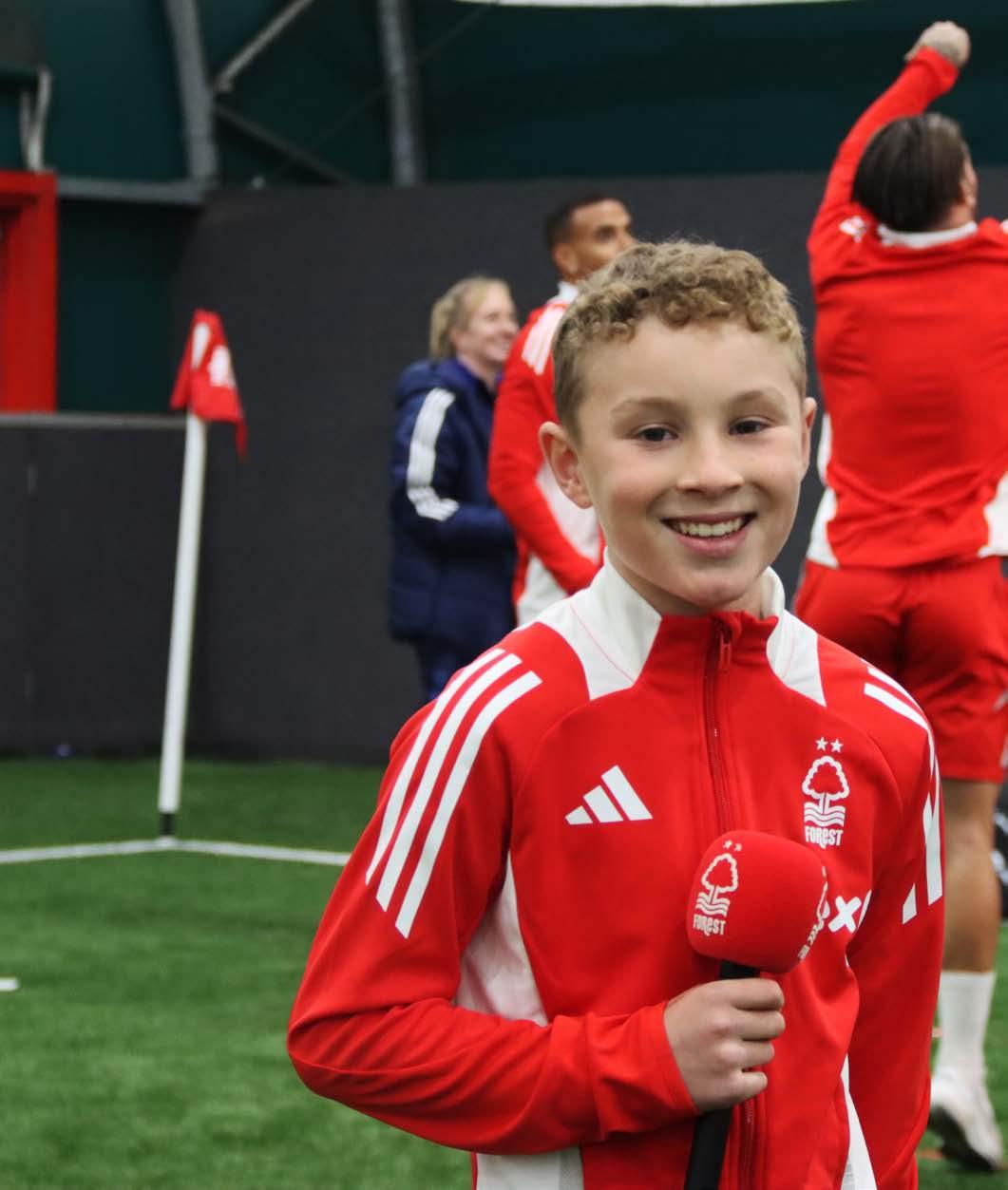
ADULTS’ RESPONSES SUMMARY:
Improved mental health: Many participants reported feeling less isolated, more positive, and better able to manage stress and mental health challenges.
Social connection: Activities helped people make new friends, reconnect with others, and feel part of a supportive community, especially among veterans.
Increased confidence: Participants gained self-esteem, communication skills, and the courage to engage in new environments and challenges.
Physical health & activity: Involvement led to improved fitness and overall wellbeing through sports and active sessions.
New skills & opportunities: Some gained qualifications, work experience, or discovered new interests and career paths.
Physical health: Goals relating to improving physical fitness, recovery from injuries, and staying active.
Social connection: Many mentioned NFCT activities helping them meet people, socialise, reduce isolation and build friendships.
Confidence: Supported people to work on their self-confidence and helped push some beyond their comfort zones.

Career & education: Helped some pursue goals linked to jobs, education (e.g. attending university) and coaching qualifications.
Football-related goals: Playing competitively (even into older age) and improving sport-specific skills and knowledge.
Confidence & wellbeing: Increased self-confidence, reduced isolation, and improved mental health.
Social connection: Opportunities to meet like-minded people, build friendships, and feel part of a community.
Education & careers: Support with university, work experience, and career pathways (e.g. refereeing, stewarding).
Football & fitness: Increased access to football (notably walking football), improved physical health, and long-term engagement in sport.
Veteran support: Strong sense of camaraderie, purpose, and belonging through Forest Forces and related activities.
JUNIORS’ RESPONSES SUMMARY:
Boosted confidence: Most participants reported feeling more confident, particularly in social settings.
Improved social skills: Many made new friends and felt more comfortable socialising.
Better football and physical skills: Many noted improvements in football ability and PE performance.
Positive mental health effects: Some shared that NFCT activity helped with reducing anxiety, increasing happiness, having a safe space to relax or talk. A few reported it helping them cope better and better regulate their emotions.
Improved behaviour: Some noted better behaviour and focus in school.
Football skill development: Most participants referenced improvements to their football abilities, including learning or furthering specific skills/techniques, joining teams, as well as refereeing.
Increased confidence: Several gained confidence, especially in football and social settings as well as team environments.

Social connections: Helped many to make new friends and be more sociable.
Personal growth: Several noted improved communication and behaviour.
Mixed impact: A number of responses indicated uncertainty over how it had helped them achieve a particular goal.
Confidence & personal growth: Increased confidence, self-belief and willingness to try new things.
Access to football & sports: More opportunities to play, develop skills, and join teams.
Friendships & social skills: Making new friends, socialising, and learning teamwork.
Life skills & opportunities: Exposure to career paths and personal development (e.g. teamwork, refereeing).
School engagement & behaviour: Helps some students stay engaged with school and incentivises better behaviour.

CONTINUING TO MOVE FORWARD
The 2024/25 season has provided Nottingham Forest Community Trust with its clearest picture yet of the difference our work makes. With two full seasons of data now available, we are better equipped to understand not just what we are achieving but where we need to grow.
This season’s findings show sustained impact across key areas such as physical and mental wellbeing, resilience, and sense of community. We have also seen meaningful improvements, particularly in mental wellbeing outcomes where both juniors and adults reported greater positive impact than the season before.
At the same time, the data has highlighted areas for development including personal development and access to opportunities that require renewed focus as we move into the 2025/26 season. These insights are not setbacks but signposts, guiding where we can do more and do better. As we look ahead, we remain committed to evolving our approach, listening to the voices of our participants, and deepening the impact of everything we deliver. By continuing to invest in insight, innovation and collaboration, we will ensure that Nottingham Forest Community Trust not only meets the needs of today but helps shape a stronger tomorrow.
APPENDIX


NFCT TRUST-WIDE DATA SUMMARY (11+)

HEALTH & WELLBEING
NFCT TRUST-WIDE DATA SUMMARY (11+)

EDUCATION, TRAINING & EMPLOYMENT
COMMUNITY ENGAGEMENT
SAMPLE INFORMATION
AGE

GENDER
Overall results shown for juniors and adults.
not to say
ETHNICITY
Overall results shown for juniors and adults. Disclosed responses only (‘prefer not to say’ removed).
Asian or British Asian (Indian, Pakistani, Bangladeshi, Chinese, Any other Asian background)
Black or Black British (African, Caribbean, Any other Black/ African/Caribbean background)
Mixed Multiple Ethnic Groups (White and Black Caribbean, White and Black African, White and Asian, Any other mixed/ multiple ethnic background)
Other Ethnic Group (Arab, Any other Ethnic group)
White British or White Other (English, Welsh, Scottish, Northern Irish, British, Irish, Gypsy or Irish Traveller, Any other White background)
SAMPLE INFORMATION
DISABILITY OR SPECIAL EDUCATIONAL NEEDS

PROGRAMME
Nottingham Forest Community Trust
The City Ground
Nottingham NG2 5FJ
0115 982 4318
community@nottinghamforest.co.uk nottinghamforestcommunitytrust.co.uk


SCAN TO DONATE
